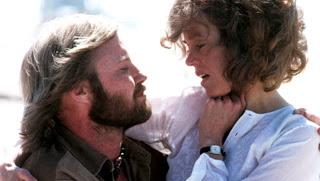 Coming Home (1978) came out the same year as The Deer Hunter and Go Tell the Spartans, showing Hollywood finally tackling the Vietnam War. Hal Ashby's melodrama with a message has aged better than its counterparts, despite occasional lapses in insight.
Coming Home (1978) came out the same year as The Deer Hunter and Go Tell the Spartans, showing Hollywood finally tackling the Vietnam War. Hal Ashby's melodrama with a message has aged better than its counterparts, despite occasional lapses in insight.Sally Hyde (Jane Fonda) arrives at a Marine base in California, just as her husband, Captain Bob Hyde (Bruce Dern) ships out for Vietnam. Sally volunteers at the local VA hospital, disgusted by the squalid conditions. She's drawn to Luke Martin (Jon Voight), a high school friend turned paraplegic veteran. Sally and Luke bond, developing a romantic attachment over time. Then Bob returns from Vietnam profoundly broken.
While set stateside, Coming Home is angrier than many Vietnam flicks. Ashby shows the plight of vets rotting in underfunded VA hospitals staffed by uncaring doctors and inefficient nurses. Sally finds her fellow service wives indifferent, becoming an activist in spite of herself. Luke channels his anger into an improvised protest after losing his friend (Robert Carradine). It's a searing indictment of a country who sends men off to war but discards them afterwards.
Ashby immerses viewers matching hospital life with Sally's character development, scored to an impressive mixtape of '60s hits. Luke his fellow vets play wheelchair basketball and attend picnics, snoozing through a patriotic speaker. Sally finds befriending a fellow wife (Penelope Milford) and romancing Luke changes everything from her hairstyle to her outlook. These relationships underpin Coming Home's message, giving abstract issues a human face.
Jane Fonda manages Sally's evolution with sensitivity, evolving from repressed Marine wife into an assured, confident woman. Jon Voight's equally powerful charting Luke's self-actualization. Both actors won Oscars. The supporting cast is more mixed: Penelope Milford scores as Sally's liberated friend, but Robert Carradine and Bruce Dern are one-note kooks. Dern's angry frothing undermines any sympathy Bob's plight might generate.
Which points to Coming Home's shortcoming. The opening shows Luke and friends debating the war, and Ashby's politics grow even cruder. Luke's liberalism renders him sexually virile while reactionary Bob can't pleasure Sally. While Luke becomes an antiwar activist, Bob turns psychopath, threatening his wife before offing himself. Along with other '70s films (The Deer Hunter, Taxi Driver) it labeled Vietnam vets as violent and unstable, moments from a meltdown.
This clumsy politicking prevents Coming Home from attaining The Best Years of Our Lives' all-time classic status. Nonetheless, recent scandals ensure that its solidarity with disabled vets remains powerful. You don't have to be Ron Kovic to find its message affecting.

